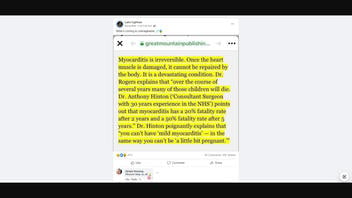
Is myocarditis, a rare disease that causes the swelling of the heart muscle, "irreversible"? Not exactly: Many patients fully recover from myocarditis, although the damage done by the disease varies based on its severity.
The claim appeared in a Facebook post (archived here) on November 11, 2021. The post has what appears to be a screenshot of text that reads:
Myocarditis is irreversible. Once the heart muscle is damaged, it cannot be repaired by the body. It is a devastating condition. Dr. Rogers explains that 'over the course of several years many of those children will die. Dr. Anthony Hinton ("Consultant Surgeon with 30 years experience in the NHS") points out that myocarditis has a 20% fatality rate after 2 years and a 50% fatality rate after 5 years.' Dr. Hinton poignantly explains that 'you can't have "mild myocarditis" - in the same way you can't be "a little bit pregnant."'
This is what the post looked like on Facebook on November 18, 2021:
(Source: Facebook screenshot taken on Thu Nov 18 21:43:56 2021 UTC)
The source of the claim is an article titled "The FDA and Pfizer Concealed Evidence That COVID-19 Vaccines Will Cause Myocarditis in Children," published on November 7, 2021. It's posted on a self-described "Christian publishing ministry" website that includes anti-COVID-19 vaccination content.
Myocarditis has been reported as a rare adverse effect of authorized mRNA COVID-19 vaccines, particularly in adolescent boys. According to this resource from the Centers for Disease Control and Prevention (CDC), the disease is mostly reported after the second dose of an mRNA COVID-19 vaccine.
Myocarditis can recur, although according to the Myocarditis Foundation, it is "extremely rare":
Yes, myocarditis can recur, and in some cases can lead to a chronically enlarged heart (called dilated cardiomyopathy). There is no known way to prevent recurrence of myocarditis. However, the risk of recurrence is low (probably about 10 to 15 percent).
The risk of recurrence is low because, as a resource from John Hopkins Medicine states, most cases of the disease are "self-resolving." While there is no cure for the disease, many patients recover from it and its effects through treatment such as prescription medicine or through adjustments toward a healthier lifestyle. Many patients who were affected with the disease from mRNA COVID-19 vaccines have appeared to recover. However, the CDC is still looking into the long-term effects of the disease in those patients.
In an email to Lead Stories on November 16, 2021, Genevieve Rumore, executive director of the Myocarditis Foundation, passed along information about myocarditis. Some of the points included that myocarditis can range in severity from asymptomatic to deadly and that recovery from the disease is possible. Additionally, in the short term and based on limited data, those with post-COVID-19 vaccine myocarditis seem to do fine in recovery.
However, when asked in a follow-up email on November 17, 2021, whether it was correct to equate "recovery" with "reversibility," Rumore replied:
Recovery is possible, but I do not believe that you can interchange the words recovery with reversible. The person will have had the disease.
During a phone call on November 18, 2021, Dan Bernstein, a professor of pediatrics who specializes in cardiology at Stanford University, reiterated to Lead Stories that "Myocarditis is a disease with a very, very large spectrum of presentation." He explained that cases of the disease often used to be diagnosed through heart biopsies, meaning that they had to be severe enough to warrant such an involved procedure.
Now, suspected cases of myocarditis are often revealed through an MRI, meaning that more cases that are non-life-threatening are considered when discussing myocarditis. He noted that more recent studies have shown that the odds of recovery to normal heart function are "quite good independent of whether the patients are treated or not."
As for the question of whether "recovery" is the same as "reversibility," Bernstein said:
That's kind of a question of semantics.
Based on the evidence, the claim's assertion that the heart cannot be repaired following myocarditis does not appear to be true.
Lead Stories also reached out to several heart and cardiology associations and other cardiology experts and will update this story with any relevant responses.
More Lead Stories fact checks related to post-COVID-19 vaccine myocarditis can be found here.


















